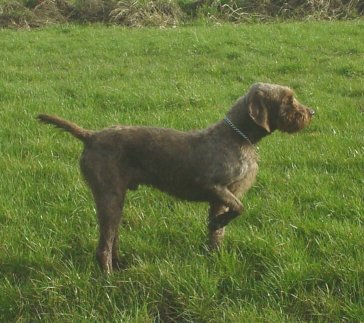
Pudelpointer
Veterinarian Reviewed on December 23, 2007 by Dr. Janice Huntingford
Physical Characteristics
Breed Group:
Sporting dogs/Gundogs.
Weight:
Approximately 55-66 pounds (25-30 kg).
Height:
Approximately 23.5-25.5 inches (60-65 cm).
Color(s):
This breed typically comes in shades of brown. For showing purposes, white, black and brindle markings are not permitted.
Coat:
The coat is of medium length and consists of harsh, dense fur.
Overview
Character:
Pudelpointers are energetic and speedy animals that love water. Intelligent and pleasant, these dogs are excellent hunting partners.
Country of Origin:
Germany.
History:
This breed was created in Germany during the late 1800’s. Developed by Baron von Zedlitz, the Pudelpointer is a cross between a Poodle (Pudel) and an English Pointer. Still quite unstable, this breed is relatively rare and has yet to gain significant popularity in Germany or in any other countries.
Name:
The name “Pudelpointer” is a cross between the names “Poodle/Pudel” and “English Pointer,” the two breeds which were mixed to create the Pudelpointer.
Temperament:
Pudelpointers are good-natured, versatile dogs. Excellent workers, these dogs are spirited trackers and great retrievers.
Care
Training:
This breed requires firm training techniques.
Activity:
The Pudelpointer is a very energetic dog and requires significant exercise.
Ownership:
This breed is used for hunting rather than for pure companionship. Pudelpointers are highly versatile hunting dogs and can work on a variety of different terrains. These dogs are most suitable for country living and require plenty of daily exercise and activity. Pudelpointers also require regular brushing as well as regular ear care.
Breeders
No breeders listed at this time.
Sign up for our newsletter and receive more articles and the latest pet health updates and special offers.
Our Expert
 Dr. Janice Huntingford
Dr. Janice HuntingfordJanice Huntingford, DVM, has been in veterinary practice for over 30 years and has founded two veterinary clinics since receiving her Doctor of Veterinary Medicine at the Ontario Veterinary College, University of Guelph. She has studied extensively in both conventional and holistic modalities. Ask Dr. Jan

